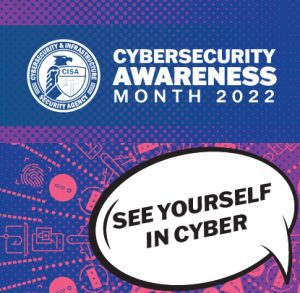October is Cybersecurity Awareness Month

October is Cybersecurity Awareness Month. The 2022 theme is “See Yourself in Cyber.”
The Internet allows for access to information 24 hours a day, 7 days a week. For schools, online capabilities not only create a vast amount of resources, but also allows for distance learning and collaboration between classes and students in different locations. Along with the benefits the Internet brings come threats to students such as cyberbullying, inappropriate content contact, sexting, sextortion/ransomware, oversharing and online predation.
Schools and school districts can implement several cyber policies and procedures to help keep their students safe from online threats. These include the creation and implementation of responsible use policies to ensure that students are aware of appropriate online behavior, the use of filtering and blocking software at school to prevent access to inappropriate content, and education about the risks of being online and how to stay safe.
You can find guidance on Cyber Safety Considerations for K-12 Schools and School Districts on the U.S. Department of Education’s Readiness and Emergency Management for Schools (REMS) Technical Assistance Center website: https://rems.ed.gov/docs/Cyber_Safety_K-12_Fact_Sheet_508C.PDF
You can also visit the National Center for Missing and Exploited Children’s website for a variety of resources:
NetSmartz is an online safety education program. It provides age-appropriate videos and activities to help teach children be safer online with the goal of helping children to become more aware of potential online risks and empowering them to help prevent victimization by making safer choices on- and offline.
CyberTipline is the nation’s centralized reporting system for the online exploitation of children. The public and electronic service providers can make reports of suspected online enticement of children for sexual acts, child sexual molestation, child sexual abuse material, child sex tourism, child sex trafficking, unsolicited obscene materials sent to a child, misleading domain names, and misleading words or digital images on the internet.
The Cybersecurity & Infrastructure Security Agency (CISA), a part of the Department of Homeland Security, has several helpful resources addressing School Cyber Safety on their website.
The National Cybersecurity Preparedness Consortium (NCPC) provides research-based, cybersecurity-related training, exercises, and technical assistance to local jurisdictions, counties, states, tribes, territories and the private sector. There will be four FREE trainings available this year in Little Rock and Fayetteville. Find more details at www.cybersecuritydefenseinitiative.org/
In addition, we provide Juvenile Takeover of Social Media: Investigations and Internet Safety, a FREE training that examines the dangers and risks of social media and Internet use for juveniles and also discusses current social media trends. The class will offered November 3 at the Northeast Educational Cooperative in Walnut Ridge. Register today!
